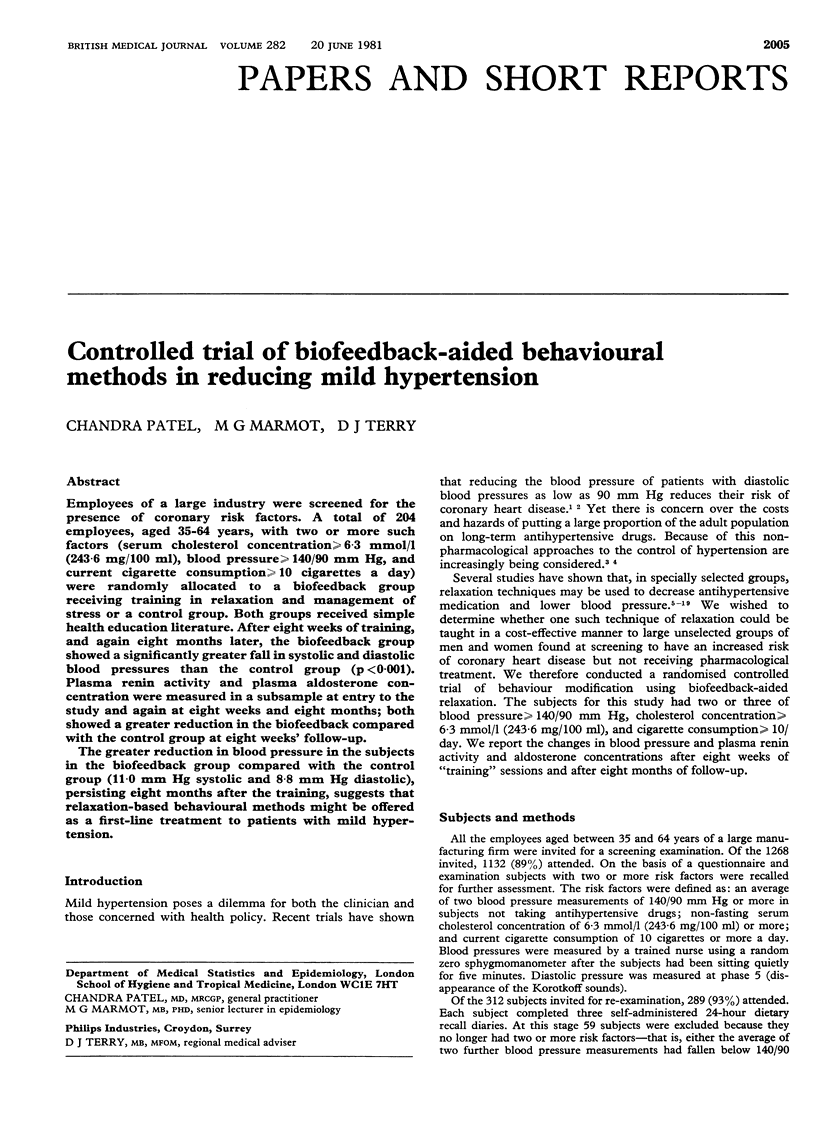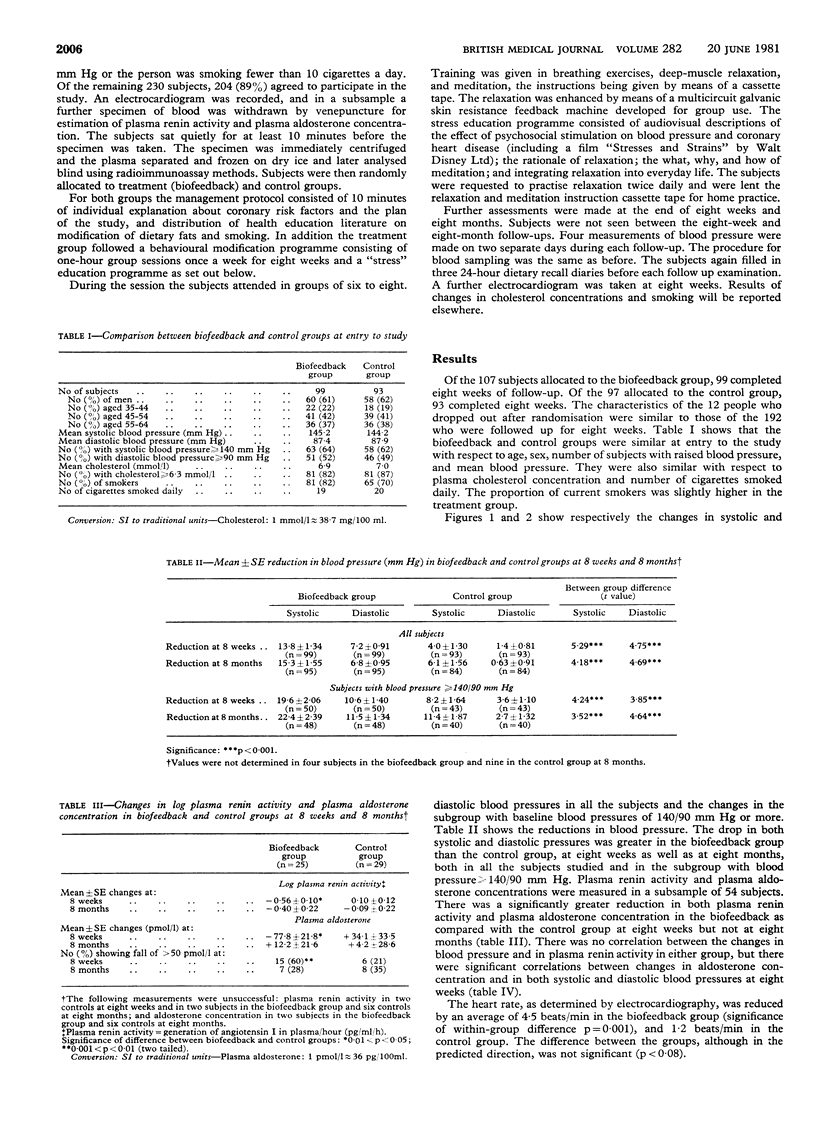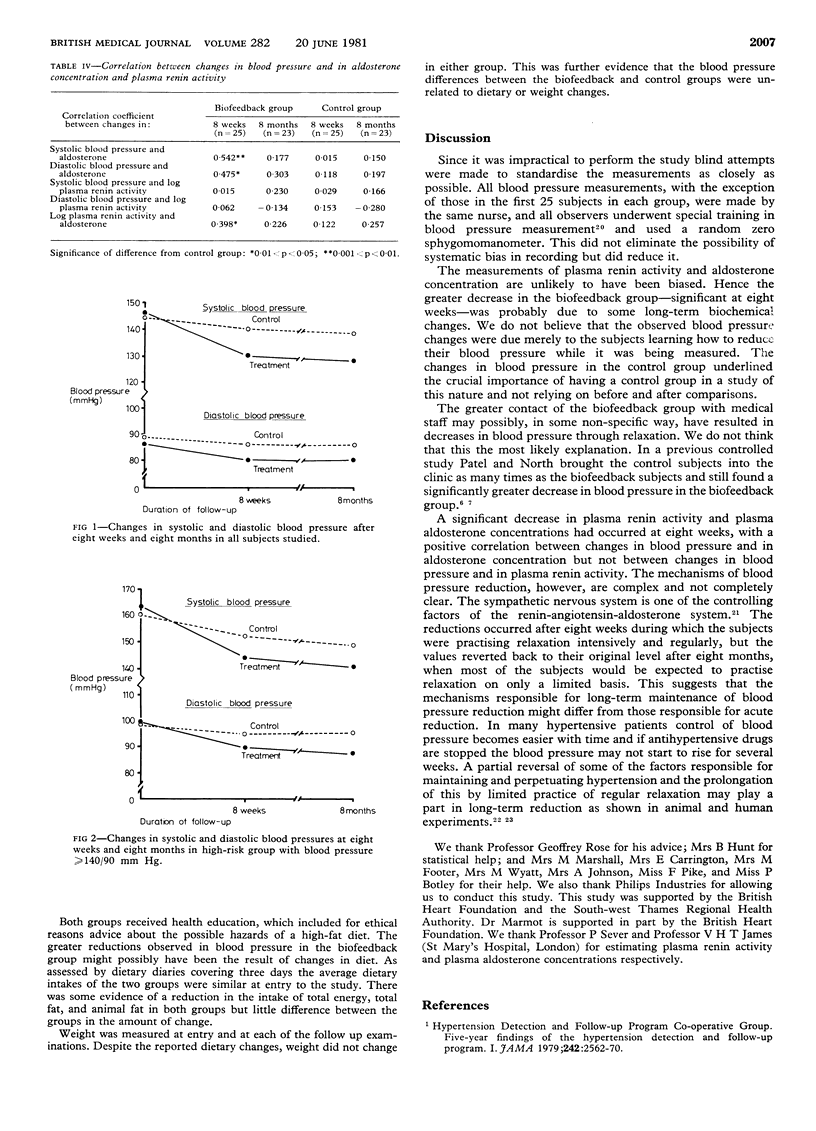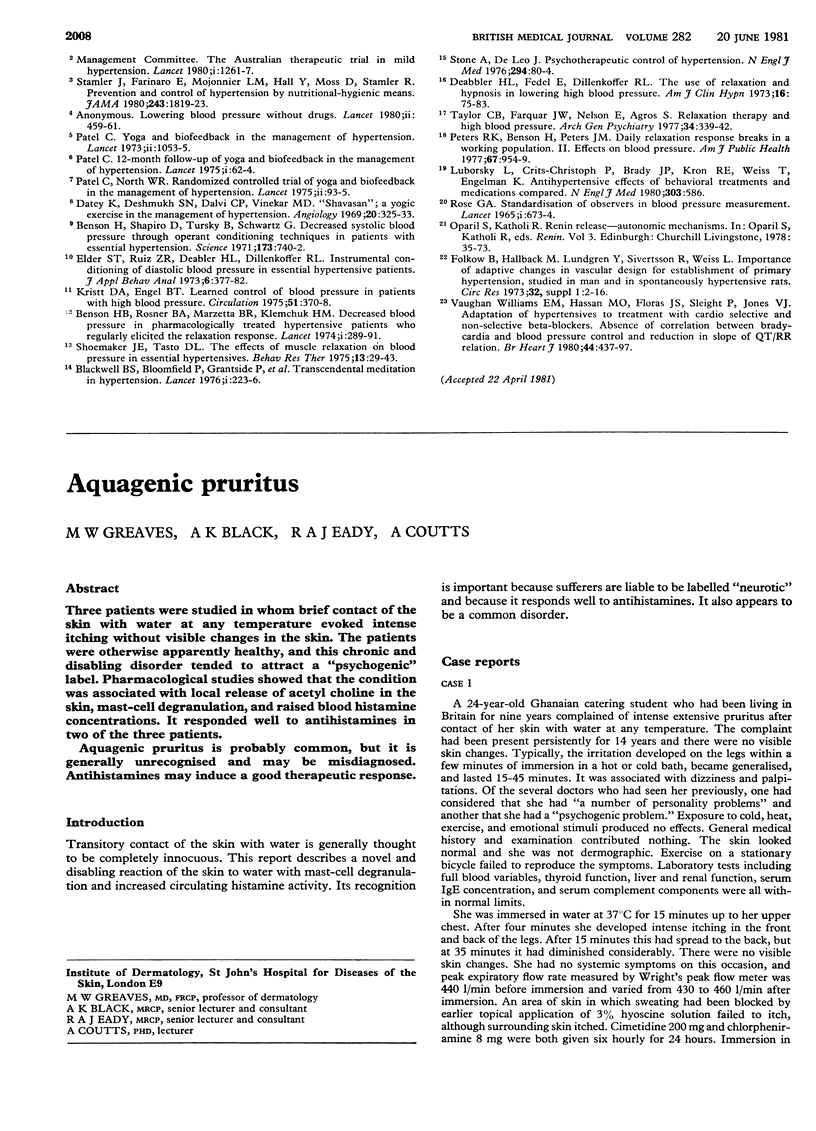Abstract
Employees of a large industry were screened for the presence of coronary risk factors. A total of 204 employees, aged 35-64 years, with two or more such factors (serum cholesterol concentration greater than or equal to 6.3 mmol/l (243.6 mg/100 ml), blood pressure greater than or equal to 140/90 mm Hg, and current cigarette consumption greater than or equal to 10 cigarettes a day) were randomly allocated to a biofeedback group receiving training in relaxation and management of stress or a control group. Both groups received simple health education literature. After eight weeks of training, and again eight months later, the biofeedback group showed a significantly greater fall in systolic and diastolic blood pressures than the control group (p less than 0.001). Plasma renin activity and plasma aldosterone concentration were measured in a subsample at entry to the study and again at eight weeks and eight months; both showed a greater reduction in the biofeedback compared with the control group at eight weeks' follow-up. The greater reduction in blood pressure in the subjects in the biofeedback group compared with the control group (11.0 mm Hg systolic and 8.8 mm Hg diastolic), persisting eight months after the training, suggests that relaxation-based behavioural methods might be offered as a first-time treatment to patients with mild hypertension.
Full text
PDF



Selected References
These references are in PubMed. This may not be the complete list of references from this article.
- Benson H., Rosner B. A., Marzetta B. R., Klemchuk H. M. Decreased blood-pressure in pharmacologically treated hypertensive patients who regularly elicited the relaxation response. Lancet. 1974 Feb 23;1(7852):289–291. doi: 10.1016/s0140-6736(74)92596-3. [DOI] [PubMed] [Google Scholar]
- Benson H., Shapiro D., Tursky B., Schwartz G. E. Decreased systolic blood pressure through operant conditioning techniques in patients with essential hypertension. Science. 1971 Aug 20;173(3998):740–742. doi: 10.1126/science.173.3998.740. [DOI] [PubMed] [Google Scholar]
- Blackwell B., Bloomfield S., Gartside P., Robinson A., Hanenson I., Magenheim H., Nidich S., Zigler R. Transcendental meditation in hypertension. Individual response patterns. Lancet. 1976 Jan 31;1(7953):223–226. doi: 10.1016/s0140-6736(76)91341-6. [DOI] [PubMed] [Google Scholar]
- Datey K. K., Deshmukh S. N., Dalvi C. P., Vinekar S. L. "Shavasan": A yogic exercise in the management of hypertension. Angiology. 1969 Jun;20(6):325–333. doi: 10.1177/000331976902000602. [DOI] [PubMed] [Google Scholar]
- Deabler H. L., Fidel E., Dillenkoffer R. L., Elder S. T. The use of relaxation and hypnosis in lowering high blood pressure. Am J Clin Hypn. 1973 Oct;16(2):75–83. doi: 10.1080/00029157.1973.10403656. [DOI] [PubMed] [Google Scholar]
- Elder S. T., Ruiz Z. R. Instrumental conditioning of diastolic blood pressure in essential hypertensive patients. J Appl Behav Anal. 1973 Fall;6(3):377–382. doi: 10.1901/jaba.1973.6-377. [DOI] [PMC free article] [PubMed] [Google Scholar]
- Kristt D. A., Engel B. T. Learned control of blood pressure in patients with high blood pressure. Circulation. 1975 Feb;51(2):370–378. doi: 10.1161/01.cir.51.2.370. [DOI] [PubMed] [Google Scholar]
- Luborsky L., Crits-Christoph P., Brady J. P., Kron R. E., Weiss T., Engelman K. Antihypertensive effects of behavioral treatments and medications compared. N Engl J Med. 1980 Sep 4;303(10):586–586. doi: 10.1056/NEJM198009043031021. [DOI] [PubMed] [Google Scholar]
- Patel C. H. Yoga and bio-feedback in the management of hypertension. Lancet. 1973 Nov 10;2(7837):1053–1055. doi: 10.1016/s0140-6736(73)92660-3. [DOI] [PubMed] [Google Scholar]
- Patel C. 12-month follow-up of yoga and bio-feedback in the management of hypertension. Lancet. 1975 Jan 11;1(7898):62–64. doi: 10.1016/s0140-6736(75)91070-3. [DOI] [PubMed] [Google Scholar]
- Patel C., North W. R. Randomised controlled trial of yoga and bio-feedback in management of hypertension. Lancet. 1975 Jul 19;2(7925):93–95. doi: 10.1016/s0140-6736(75)90002-1. [DOI] [PubMed] [Google Scholar]
- Peters R. K., Benson H., Peters J. M. Daily relaxation response breaks in a working population: II. Effects on blood pressure. Am J Public Health. 1977 Oct;67(10):954–959. doi: 10.2105/ajph.67.10.954. [DOI] [PMC free article] [PubMed] [Google Scholar]
- ROSE G. STANDARDISATION OF OBSERVERS IN BLOOD-PRESSURE MEASUREMENT. Lancet. 1965 Mar 27;1(7387):673–674. doi: 10.1016/s0140-6736(65)91827-1. [DOI] [PubMed] [Google Scholar]
- Shoemaker J. E., Tasto D. L. The effects of muscle relaxation on blood pressure of essential hypertensives. Behav Res Ther. 1975 Feb;13(1):29–43. doi: 10.1016/0005-7967(75)90049-2. [DOI] [PubMed] [Google Scholar]
- Stamler J., Farinaro E., Mojonnier L. M., Hall Y., Moss D., Stamler R. Prevention and control of hypertension by nutritional-hygienic means. Long-term experience of the Chicago Coronary Prevention Evaluation Program. JAMA. 1980 May 9;243(18):1819–1823. [PubMed] [Google Scholar]
- Taylor C. B., Farquhar J. W., Nelson E., Agras S. Relaxation therapy and high blood pressure. Arch Gen Psychiatry. 1977 Mar;34(3):339–342. doi: 10.1001/archpsyc.1977.01770150097011. [DOI] [PubMed] [Google Scholar]
- The Australian therapeutic trial in mild hypertension. Report by the Management Committee. Lancet. 1980 Jun 14;1(8181):1261–1267. [PubMed] [Google Scholar]


